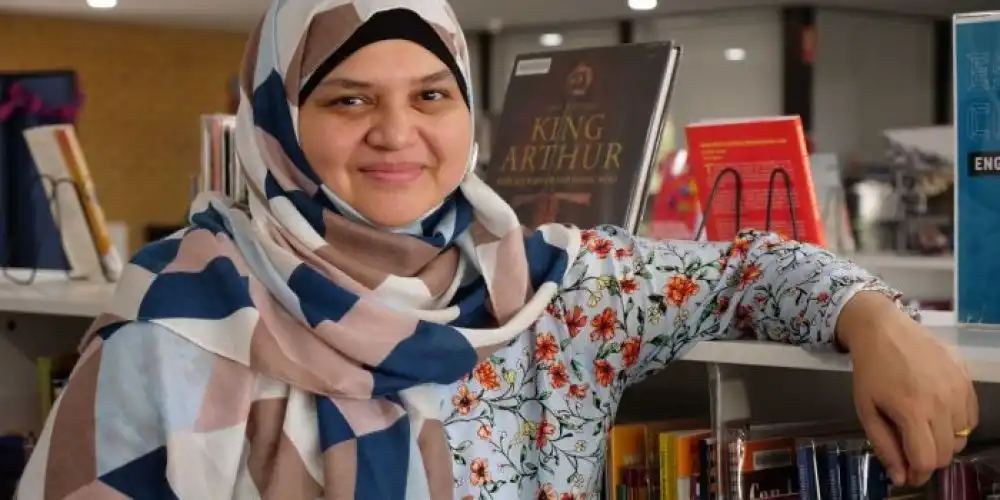Study finds non-English speaking migrants adopt Australianisms to fit in

But migrants new to western New South Wales are seeking out special assistance to help them wrangle the region's rife usage of Aussie slang.
When Pakistani-born teacher Ambereen Khalid moved to Dubbo three years ago, she was astounded by locals' relaxed lexicon, so much so it was "difficult to understand".
"In regions they use very informal English; when I first heard this, I felt so bad, I thought, 'Oh my goodness what kind of English are they speaking?'" she said.
To help her settle in and make mates faster, she teamed up with a mentor who taught her Australian slang words like 'mozzie', 'rightio' and 'mate'.
Key points:
- A study from ANU has found that people from non-English speaking backgrounds are more likely to adopt Aussie slang than those raised as American-English speakers
- Migrants tells the ABC that learning Australian slang is an additional but essential skill to communicating with locals and settling into life in regional Australia
"Now, I can communicate with my colleagues and my friends in the manner that they want me to communicate with them," Ms Khalid said.
"It's kind of fun and I feel really good about it."
Before receiving her mentorship, Ms Khalid felt like she was "just shadowing" her colleagues.
But now she said is acquainted with slang vocabulary and "loving it".
"I just want to behave like a local and talk like a local," Ms Khalid said.
Sanu Joy and Didiya Isaac's story
"G'day mate" and "how are ya?" are among the phrases Indian-born nurses Sanu Joy and Didiya Isaac have adopted since arriving in Australia.
Five years ago, the couple moved to western NSW and took up jobs at Dubbo Base Hospital.
But they needed a bit of help understanding their patients and their creative use of English language.
"I used to find slang difficult to understand especially when talking with elderly people, and in particular, elderly farmers," Mr Joy said.
"They would come and talk to us and we would be like, 'oh my god what are earth are they talking about?'
"Sometimes at work we still go back to the tea room and ask our colleagues 'what does this mean?' and they explain to us, 'this how the regional people talk'."
Asking questions about slang terms was how they learnt to fit right in with locals.
"As long as you're not reluctant to ask questions or raise doubts to your colleagues, they will explain to you what this is," Mr Joy said.
These days, they are thriving.
"Slang terms come naturally these days," Mr Joy said.
"Our community has us feeling like we belong here … now we are a family.
"I don't think it's hard for us anymore."
Researcher studies Aussie idioms
Linguistics professor Dr Ksenia Gnevsheva from the Australian National University is fascinated by the unique ways Australians communicate.
She recently studied how migrants in Australia acquired slang words.
"The way people adopt local words and phrases after arriving in Australia is reflective of their engagement with the Australian culture," Dr Gnevsheva said.
Her study, which will be published in July, revealed that non-English speaking migrants picked up the Australian dialect at a faster rate than English-speaking migrants.
Dr Gnescheva and her colleagues tested four groups of people living in Australia: native Russian speakers, whose first exposure to English was in Australia; American migrants who experienced Australian English as their second dialect; Russian speakers who had lived in America first, and compared these subjects with Australian native speakers.
The groups were shown pictures of 50 items that have distinctly Australian and American names such as jam (jelly), esky (cooler), lolly (candy), lift (elevator), rockmelon (cantaloupe), tomato sauce (ketchup), torch (flashlight) and queue (line) and were asked what they called these things.
Despite a perception that immigrants are resistant to assimilation, their research found people who speak a foreign language are actually more likely to adopt the Australian lexicon.
They found second language speakers who moved from Russia straight to Australia used Australian words as often as native speakers of Australian English.
Meanwhile, native speakers of American English only used Australian words 20 per cent of the time.
Dr Gnescheva observed second-language speakers of English are "more flexible" in terms of their vocabulary usage.
"For instance, we found native speakers of Russian who moved to the US then Australia, were more adaptable and used more Australian words than native speakers of English who moved from the US to Australia," she said.
Dr Gnescheva said multiple factors influenced how quickly migrants adopted Australian idioms.
"It depends on how much a particular person wants to fit in, and how much they feel like an Australian already," she said.
"Also, the more Australians that you have in your social network, the more likely you would be to use Australian words with them."











